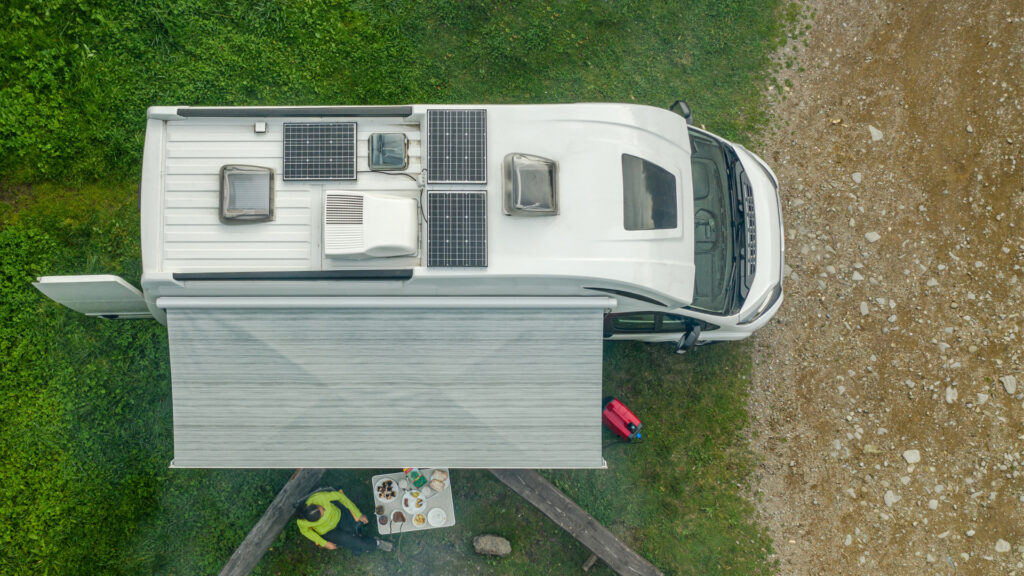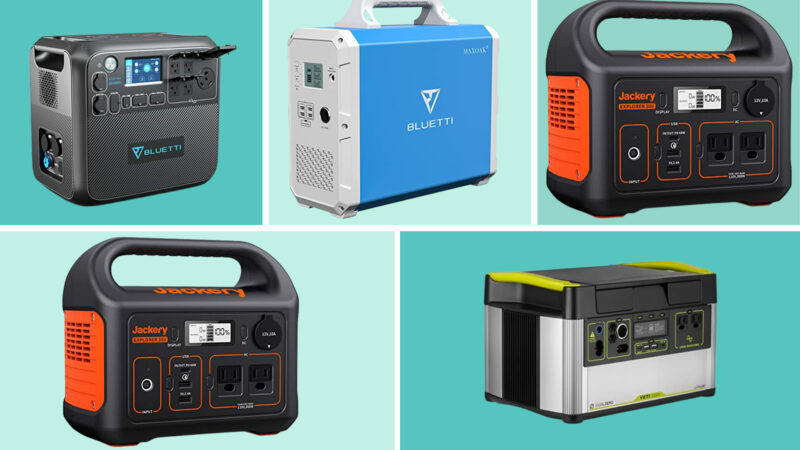Table of Contents Show
Generators have long been one of the most valuable parts of an RV electrical system, especially for those who camp at spots without power hookups.
But as solar power has become a bigger part of the RV world, generators have naturally begun to transition from noisy, polluting gas generators to solar alternatives.
But some may still be wondering exactly how these systems work and whether they can pull their weight.
Here’s what you need to know about solar generators for RVs.
What Is a Solar Generator?
A solar generator for RVs combines elements of a traditional gas-powered generator with the green, renewable energy of solar power.
These all-in-one systems (sometimes called portable power stations) incorporate power storage and processing and interface directly with your rig’s power system.
Through the use of solar panels, power is produced wherever you are, as long as you have a clear view of the sun.
This energy then passes to an included charge controller, making it available for immediate use or storing it in onboard batteries for later use.
Solar generators for RVs also typically are equipped with an inverter, which changes the 12V DC electricity generated by the panels into the 110V AC power needed to run many appliances and systems.
You can plug into these solar generators as you would any other generator or shore power using your rig’s power cord.
The systems also sometimes include additional outlets and charging ports that users can take advantage of.
Can You Power an RV With a Solar Generator?
You can absolutely use the power from a solar generator for your RV – though whether it’s enough to fully power your rig will depend on your lifestyle and particular generator.
Most generators only supply a few hundred to a thousand watts of AC electricity.
That’s typically less than most folks need to power a normal collection of appliances and devices.
However, those with a high-capacity generator willing to be mindful of their power usage may find a generator sufficient to fully power their rig.
Can You Charge an RV Battery With a Solar Generator?
Yes! Think of a solar generator just like any other generator or shore power.
By plugging your rig into the generator, any power not being immediately used will go toward charging your RV batteries.
How much charge you’ll get and how quickly this will happen depends on your particular generator.
Even if they can’t fully recharge your rig’s batteries, they can still provide a renewable power boost when running low.
What to Consider When Buying a Solar Generator
There are a few key things to consider when shopping for your new solar generator. But depending on your needs and travel style, some may be more important to you than others. Here’s a look at the most crucial to understand.
Your Power Needs
The first thing you should consider is how much power you typically use in your RV.
That will help you find generators of an appropriate size.
Make a list of all the appliances and systems you use on average camping days, and find the wattage they need.
This can usually be on the device or in the documentation for larger appliances.
Then, consider what might be drawing power at the same time to find the capacity you’ll need.
Keep in Mind: Without the right RV power cord, you wouldn’t be able to enjoy the majority of the comforts of your RV. Here’s everything you need to know about RV Power Cords
Charging Speed
How quickly your generator charges can be a significant factor in finding the right one for you.
While infrequent power users might not mind charging up their generator after every trip, those who need more frequent use might be frustrated waiting extra hours to charge up.
Weight
Don’t forget you’ll need to actually lug this thing around with you wherever you go! This is something to keep in mind.
Think about the physical effort required to set it up at your campsite and the extra weight added to your rig.
While most solar generators for RVs are between 30 pounds and 60 pounds, if your RV is close to its max weight, still keep this extra in mind.

Price
Solar generators for RVs can be found across the price spectrum, ranging from affordable to top-of-the-line.
Budget-conscious RVers may need to opt for a lower-powered model with fewer features, while those with more money to spend can get a premium generator with higher wattage and extra features.
The Best Solar Generators for RVing
There are many options out there for solar generator buyers, but some are head and shoulders above the rest.
Here are a few of our top picks, including choices for heavy power users and those on a budget.
Highest Rated: Jackery 500 Portable Solar Generator
- LONG LASTING ENDURANCE: The Explorer 500 portable power station is built with the lithium-ion battery pack, in a safely...
- SUPPORT PASS-THROUGH CHARGING: This power station features 1* AC outlet (110V 500W 1000W Peak), 3*USB-A ports, 2* DC...
For a compact, relatively affordable solar generator for your RV, this is our top choice. It can provide 500 watts of AC power and numerous other charging ports for 12V and USB.
This versatile generator has enough juice for more than 50 phone changes, seven hours of TV, and many more uses.
Plus, it has a solar charge controller, meaning no need for additional hardware between your panel and generator.
It’s also only 13 pounds, making it easy for just about anyone to transport and set up.
Runner Up: MAXOAK Portable Power Station
- 【1500Wh Huge Capacity Power Station】MAXOAK EB150 is equipped with 1500Wh lithium power storage, and with a large AC...
- 【Expandable Capacity】EB150 supports to handle1 BLUETTI B300(3072Wh) to expandable the capacity from 1500wh to...
With a 1000-watt capacity, the MAXOAK provides twice the power of the Jackery for those who need some extra juice. This means you’ll be able to run more and larger appliances like blenders, electric cookers, and mini-fridges.
It also boasts two AC outlets to the Jackery’s one.
However, it’s also several hundred dollars more expensive and takes longer to fully charge.
At nearly 38 pounds, it’s more difficult to carry than lighter-weight models.
Keep in Mind: Have you heard about California’s new generator laws? So are Generators Still Legal in California? Let’s find out.
Runner Up: Goal Zero Yeti 1000X Solar-Powered Generator
- Power. Anything. Anywhere. 983 Watt Hours makes this versatile station an essential for powering devices and smaller...
- 7 Versatile Ports, 983 Wh Capacity: Power CPAP machines, WiFi routers, pellet grills and more with the Yeti 1000X, which...
This Goal Zero model is another excellent choice for a solar generator for an RV.
Like the MAXOAK, it offers 1000 watts of AC power but is more than 15% lighter at just under 32 pounds.
In addition to the ability to charge from solar panels and a standard wall outlet, you can even charge your Yeti through your vehicle’s 12V car charger port.
However, it’s also the most expensive of our top picks, potentially placing outside the budget of some RVers.
Best Budget Option: Jackery 300 Portable Solar Generator
- SPEED UP YOUR RECHARGEABILITY: It takes only 2 hours to recharge 80% battery of the power station through the wall...
- SAFE & STEADY POWER SUPPLY: Armed with a 293Wh lithium-ion battery pack, the Explorer 300 features 2 Pure Sine Wave AC...
If your finances don’t allow you to drop a ton of cash on a solar generator for your RV, check out this Jackery model.
The Explorer 300 offers 300 watts of power at just under $300.
That’s about half the price of the higher-end 500 model and just a fraction of the cost of many other choices.
With the same quality craftsmanship and features, this generator provides a lower-power option for the lower-budget RVer.
Highest Wattage: BLUETTI Portable Power Station
- [Powerful Beast] - AC200MAX power station comes with amazing 2048Wh LFP cells and a 2200W inverter, making it a safe and...
- [Expandable Capacity] - AC200MAX supports 2 BLUETTI B300(3072Wh) for a whopping 8192Wh or 2 B230(2048Wh) for 6144Wh,...
For heavy energy users, it doesn’t get better than this BLUETTI solar generator.
With a whopping 2200-watt inverter, expandable battery capacity, and fast-charging capabilities, it’s perfect for high-usage situations.
While it may be the most expensive and heaviest, that extra cost and weight make up for it with extended usability.
Is a Solar Generator for RV Worth It?
For some, a solar generator for RV is simply not worth it. These may include infrequent campers or those who almost always stay at parks or campgrounds with shore power available.
These folks won’t need the solar generator. And, with even budget options costing several hundred dollars, they would be better off saving the money.
Solar generators may also not be the best choice for heavy power users. They may not be able to produce enough energy to meet their needs.
These RVers might benefit from a full solar power system for their rig. But for many (especially those who like to boondock), a solar generator for your RV is absolutely worth the cost.
Having a solar generator can open up a whole new world of camping spots that may have been previously unavailable without doing without power or using a loud, polluting gas generator.
At a lower price point than many full RV solar systems, they’re also an excellent choice for value-minded RVers.
Does any of this sound like you? Would you consider adding this valuable piece of eco-friendly equipment to your RV power system?
Last update on 2025-01-19 / Affiliate links / Images from Amazon Product Advertising API












I hate the term “solar generator” as these units sold as is without solar panels do not “generate” electricity. They are batteries that store electricity. They come with a charge controller so you can charge them back up efficiently and prevent over-charging and an inverter to convert the 12V DC electricity stored in the battery to 110/120V AC power for “normal” appliances. They are the same concept as your batteries on your RV (especially if your rig is equipped with solar). They are the same concept as the batteries in a UPS (Uninterruptible Power Supply). They are the same concept as a Tesla Powerwall. The only difference is the execution (charge controller, type and size of battery, inverter). Based on this I think the term “solar generator” is very misleading. A “generator” actually generates electricity without storing it. As long as the motor is running, the motor is driving the generator, which then outputs electricity. Shut off the motor and then the “generation” of electricity stops. “Generators” are the same as your car (gas/diesel engine) and alternator. They are the same as a hydro-electric dam (water turning a turbine). They are the same as a fossil fueled/nuclear power plant (burn the fuel to produce steam which turns a steam turbine). Again the only difference is the execution.
I wish they would stop using the term “solar generator”.